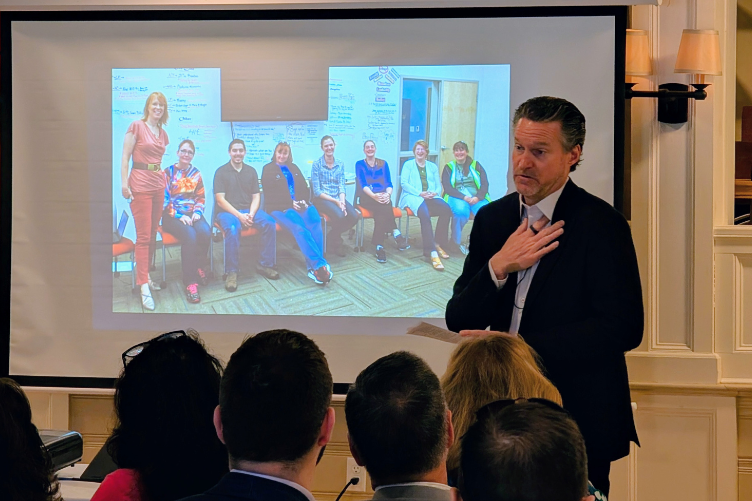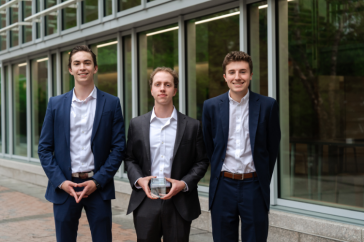
Rod Harl, chairman of Alene Candles, headquartered in Milford, New Hampshire, shares his story about transforming company culture during a recent CEO Speaker Series meeting at the Three Chimneys Inn in Durham.
Leaving school doesn’t mean leaving learning behind — especially for business leaders.
Through the CEO & Family Enterprise Center at the Peter T. Paul College of Business and Economics, the University of New Hampshire helps business leaders continue their professional growth. The center offers a suite of membership programs, including the Family Business program, CEO Speaker Series, CEO Peer Groups, and Next Generation Peer Groups, tailored to meet leaders at different stages of their journeys.
"We provide an evergreen solution for continued growth,” says Michelline Dufort, director of the center. “It's all about peer-to-peer connections and learning. Everything we do revolves around that model. We act as generalists, facilitators, coaches, and conveners, bringing in resources, expertise, and, most importantly, opportunities for business owners and leaders to learn from one another."
The center’s affiliation with Paul College helps UNH stay connected with alumni and industry leaders while also gaining insight into evolving business challenges, helping shape curriculum and programs that better prepare students for the workforce. For business leaders, the center provides access to future talent through internships and hiring pipelines, as well as opportunities for collaboration.
“The beauty for Paul College is that it keeps CEOs connected to the school long after they’ve left their formal learning,” Dufort says. “We want to create more and more conversations with businesses to ensure we’re creating a product that speaks to businesses today.”
A Resource for CEOs
The monthly CEO Speaker Series (which runs September–May) involves members coming together to listen to a local CEO or high-level business leader discuss their personal and professional journeys, including pivotal moments, industry challenges, and decision-making processes.

"We ask them to share what keeps them up at night — the moments of epiphany or the pivotal decisions that propelled them to where they are today," Dufort says. "We also encourage them to dive into their industries, discussing the unique challenges and opportunities they face."
During the April 2025 program, Rod Harl, chairman of Alene Candles, headquartered in Milford, New Hampshire, with manufacturing locations in Ohio, shared how he transformed his company culture after discovering toxic workplace issues through Glassdoor reviews in 2016. Harl implemented a multi-pronged approach that included defining company values, making leadership changes, introducing mindfulness techniques while becoming more present, learning employee stories, and creating an environment where workers had a voice.
“Business owners have a lot of power and have to be mindful of how they wield that power,” Harl told his colleagues, noting that many of his employees have applied the mindfulness techniques they learned at work to their personal lives and positively impacted their communities.
Justin Gamester ‘03, president and CEO of Piscataqua Landscaping and Tree Service, says he learned about the speaker series after being invited to speak and has been coming back since.
"The value in hearing other people's stories about either how they started their business or how they got into their career, challenges, successes, is just super beneficial and oftentimes very motivating," Gamester says.
Gamester particularly enjoys stories where peers talk about setbacks and how they responded because everyone can relate, regardless of industry.
"The challenges of small business exist in every small business," Gamester says. "Having those conversations and networking makes you realize that it's not just in your business. You can find solutions in a different industry. While the challenges change all the time, they exist with other people too, and you can have good conversations about how to overcome them."
Bill Stowell Sr., president of the Collins Business Group, values networking with his peers.
“If nothing else, you need to learn that you can't operate in a vacuum,” Stowell says. “You need exposure to people in other industries.”
The CEO Peer Groups are a more casual setting where 7-9 business leaders come together with a facilitator for supportive and confidential conversations, according to Dufort.
Family Businesses Are Not Alone
For smaller family-run businesses, the Family Enterprise Center provides targeted support and community. While the group sometimes joins the CEO Speaker Series, most of its programming is distinct, including site visits to fellow businesses around the state.
Jeff Pierson ‘86, president and owner of Foley Oil and Propane, says these programs have connected him with peers who offered valuable perspectives on everything from succession planning, company culture to industry and regulatory trends.
"One of the recent programs focused on generational differences in the workplace — what defines a Baby Boomer, a Millennial, Gen X, or Gen Z, and how each generation gets and processes information. I found that interesting,” Pierson says. “It made us step back and reassess how we attract and retain employees in a changing workforce.”
Regarding succession planning, Pierson found value in hearing how other family businesses structured their transitions, though he ultimately took a different approach.
“It has been eye-opening to hear about the many ways families design their own succession plan. I think each one has to be different to accommodate all family members affected. We have been very pleased with the way our succession plan from Generation 3 to Generation 4 has developed. It will prove beneficial to all,” Pierson says.
Pierson, who was originally in banking, purchased Foley Oil and Propane in 1998 after the sudden passing of his father-in-law. He’s now preparing to hand the business over to his daughter, Megan Sousa, and her husband, Adam.
Sousa is building her own connections through the center's next-generation peer group while leveraging those her father established.
"Having those connections made a big difference. Those relationships helped with the transition process and boosted my confidence. It made me feel like, ‘OK, maybe we are on the right track. We are taking the right steps,’” Sousa says. “There are days when you feel kind of alone, wondering if anyone else is dealing with the same challenges and who you can talk to. But then you go to these meetings, and it’s like, ‘OK, we’re not alone in this.’”
-
Written By:
Aaron Sanborn | UNH Paul College & CHHS | aaron.sanborn@unh.edu
















































